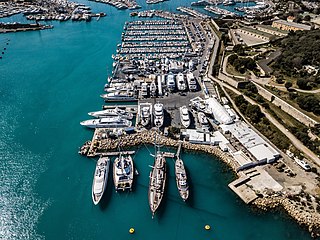The Greenock Dockyard Company was a Scottish shipbuilding and ship repair firm located at Greenock, on the River Clyde.
The Greenock Dockyard Company was a Scottish shipbuilding and ship repair firm located at Greenock, on the River Clyde.
The company was established by J E Scott of Greenock, with the yard at Cartsdyke being taken over in 1879 by Russell and Company, of Greenock, which later became Lithgows. The dockyard had been well established when it merged with the Grangemouth Dockyard Co Ltd to become the Grangemouth and Greenock Dockyard in 1900. After eight years, the name changed to Greenock & Grangemouth Dockyard Co. The Greenock yard was then sold to the operators of the Clan Line in 1918 and in 1920 it was incorporated as the Greenock Dockyard Co Ltd.
In 1935, the Greenock Dockyard exchanged its yards with those of their neighbour, Scotts Shipbuilding and Engineering Company. The Greenock Dockyard Company built a large number of merchant ships for British merchant lines before, during and after the wars. In 1966 the company was taken over by Scotts Shipbuilding & Engineering Co Ltd, and then became part of Scott Lithgow in 1967. The Cartsdyke yard eventually ceased building ships and closed in 1979.

A shipyard, also called a dockyard or boatyard, is a place where ships are built and repaired. These can be yachts, military vessels, cruise liners or other cargo or passenger ships. Compared to shipyards, which are sometimes more involved with original construction, dockyards are sometimes more linked with maintenance and basing activities. The terms are routinely used interchangeably, in part because the evolution of dockyards and shipyards has often caused them to change or merge roles.

Greenock is a town in Inverclyde, Scotland, located in the west central Lowlands of Scotland. The town is the administrative centre of Inverclyde Council. It is a former burgh within the historic county of Renfrewshire, and forms part of a contiguous urban area with Gourock to the west and Port Glasgow to the east.

HMS Athene was a Royal Navy aircraft transport. She was a merchant conversion, requisitioned by the Navy during the Second World War and returned after its end. She is the only ship of the Royal Navy to be named after the Greek goddess Athene. She was broken up in 1963.
British Shipbuilders (BS) was a public corporation that owned and managed the shipbuilding industry in Great Britain from 1977 through the 1980s. Its head office was at Benton House in Newcastle upon Tyne, England.

The Fairfield Shipbuilding and Engineering Company, Limited, was a Scottish shipbuilding company in the Govan area on the Clyde in Glasgow. Fairfields, as it is often known, was a major warship builder, turning out many vessels for the Royal Navy and other navies through the First World War and the Second World War. It also built many transatlantic liners, including record-breaking ships for the Cunard Line and Canadian Pacific, such as the Blue Riband-winning sisters RMS Campania and RMS Lucania. At the other end of the scale, Fairfields built fast cross-channel mail steamers and ferries for locations around the world. These included ships for the Bosporus crossing in Istanbul and some of the early ships used by Thomas Cook for developing tourism on the River Nile.

Bowling is a village in West Dunbartonshire, Scotland, with a population of 740 (2015).
Sir William James Lithgow, 2nd Baronet was a Scottish industrialist and vice-chairman of Lithgow Group. In 1952 he inherited the Scottish shipbuilding company, Lithgows, which was established by his grandfather, William Lithgow. Economic and political changes, especially the nationalisation of British shipbuilding in the 1970s, prevented Sir William from simply continuing the family business, and he therefore led it in new directions, including engineering, salmon farming and other marine and agricultural matters. He described himself as an "industrialist and farmer". Since 1999 his son James has been chairman of the Lithgow Group.
Seawind Barclay Curle is a British shipbuilding company.

Scotts Shipbuilding and Engineering Company Limited, often referred to simply as Scotts, was a Scottish shipbuilding company based in Greenock on the River Clyde. In its time in Greenock, Scotts built over 1,250 ships.
Lithgows Limited is a family-owned Scottish company that had a long involvement in shipbuilding, based in Kingston, Port Glasgow, on the River Clyde in Scotland. It has a continued involvement in marine resources.
Scott Lithgow, Limited was a Scottish shipbuilding company.
Storaa was a 1,980 GRT cargo ship which was built in 1918 by the Greenock & Grangemouth Dockyard Company as Wellpark for British owners. In 1927, she was sold to Belgium and was renamed Navex. A further sale in 1937 saw her renamed Prina. In 1938, she was sold to the Netherlands and was renamed Willy. In 1939, she was sold to Denmark and was renamed Storaa.

The Acacia class was a class of twenty-four sloops that were ordered in January 1915 under the Emergency War Programme for the Royal Navy in World War I as part of the larger Flower class which were also referred to as the "Cabbage class", or "Herbaceous Borders". They were ordered in two batches, twelve ships on 1 January and another twelve on 12 January, and all were launched within about four or five months, and delivered between May and September 1915. They were used almost entirely for minesweeping until 1917, when they were transferred to escort duty.

Ferguson Marine Limited is a shipbuilding company whose yard, located in Port Glasgow on the Firth of Clyde in Scotland, was established in 1903. It is the last remaining shipbuilder on the lower Clyde and is currently the only builder of merchant ships on the river.

The 24 class was a class of minesweeping sloops. They were derived from the preceding Flower-class sloop, but designed to appear double-ended. Twenty-four ships to this design were ordered between December 1916 and April 1917 under the Emergency War Programme for the Royal Navy in World War I, although two of them were cancelled before launch. All were named after famous racehorses, but they were not named Racehorse class as the Admiralty realised that this could easily be confused in communications with the Racecourse class of paddle minesweepers, and they officially became the 24 class.
The Grangemouth Dockyard Company was a British shipbuilding and ship repair firm located at Grangemouth, on the Firth of Forth, Scotland.
Caledonia, was launched at Greenock, Scotland, in 1794. The French captured her in 1795.
Robert Sinclair Scott was a Scottish shipbuilder. Along with his brother John he built more than a thousand ships at the family firm Scotts Shipbuilding and Engineering Company.